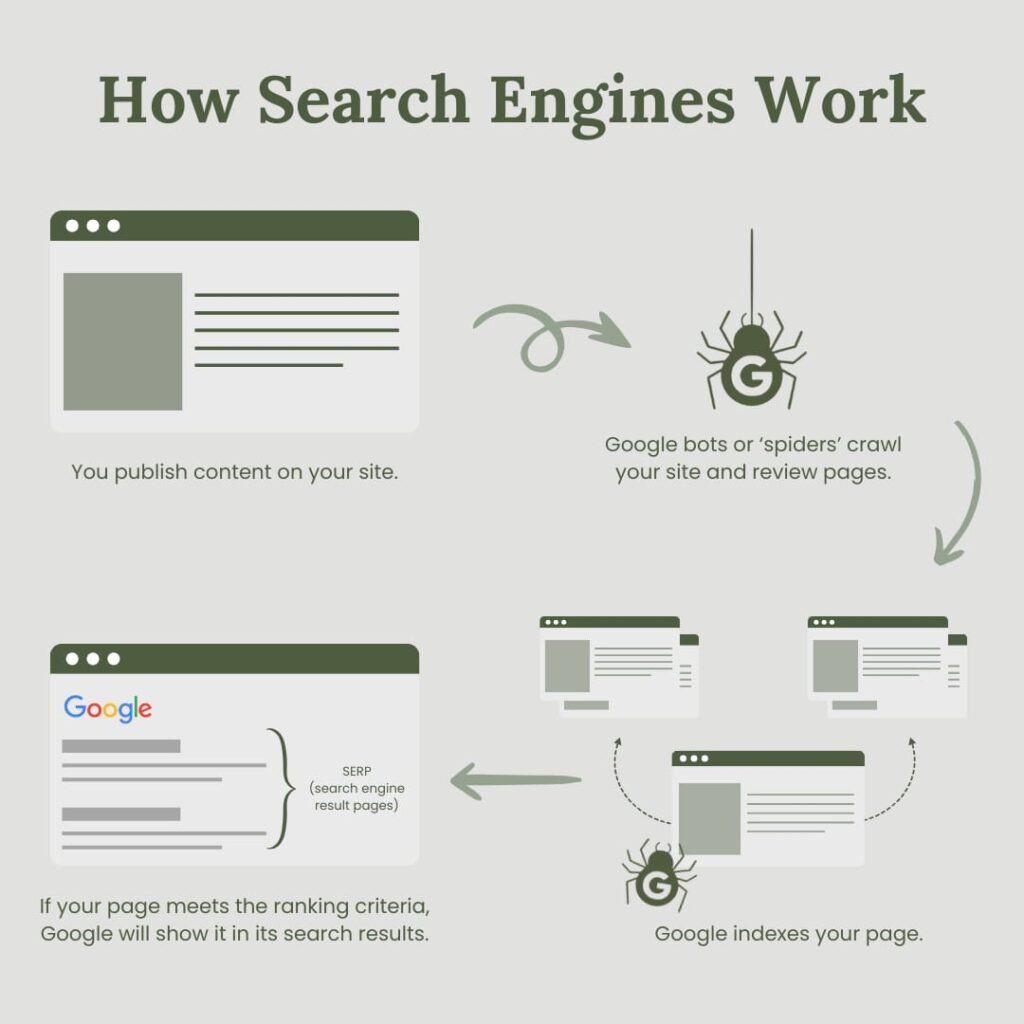Table of Contents
Navigating the ever-evolving world of SEO can feel like trying to find a needle in a haystack. Amidst the flood of generic tactics and one-size-fits-all approaches, standing out seems like a distant dream. But fear not! If you’re ready to elevate your online presence and master SEO like a pro, you’ve come to the right place.
Mastering SEO – Understanding the Basics
Alright, so here’s the deal with search engine optimization (SEO): it’s all about getting more eyeballs on your website from a search engine’s organic rankings. When your site pops up higher in those search results, more people click on it—simple as that!
And here’s the kicker: It’s not just about slapping some keywords onto your page and calling it a day. Nope, SEO involves a mix of technical wizardry and content magic. Think creating top-notch content, sprinkling in those key phrases people are searching for, and even getting other sites to give you a shoutout.
So, in a nutshell, mastering SEO is your ticket to climbing the ranks in those non-paid search results and getting more folks to check out what you’ve got going on.
SEO vs PPC
Ever noticed when you search something on Google, you get two types of results?
- Paid Results: These are the ads you see—the ones you have to pay for via pay-per-click (PPC) advertising.
- Organic Results: Here’s where you “earn” your spot through SEO magic.
You might wonder, “Why not just pay for the ads?”
Simple: Most folks scroll past those ads and click on the organic results instead.
Sure, SEO demands time, sweat, and maybe a bit of resources, but the payoff is sweet. Once you snag those top spots for your keywords, you’re set. You’ll reel in organic traffic—no payment necessary. And guess what? It sticks around, even when you’re not shelling out cash.
How do Search Engines Work?
Let’s dive into how search engines, like Google, get the job done.
Ever wonder how you ended up here? Well, most likely, you typed in a search like ‘What is SEO?’ and let the search engine take it from there.
Wondering how Google figures out what to show you? Well, it has got this whole process to discover and rate content. Here’s how it goes down:

Google, for instance, sifts through its vast index of “hundreds of billions” of web pages to serve up a batch of results that hit the bullseye for your query.
How Does SEO Work?
Google has these fancy-schmancy things called “algorithms” that basically determine where your webpage lands in search results. They analyze tons of stuff to figure this out. Now, you don’t have to be a rocket scientist to understand these algorithms (heck, no one does 100% certain). But, getting the gist helps you grasp how SEO rolls and what you need to do to ace it. It’s all about mastering SEO to boost your page’s Google result rankings!
Although Google doesn’t spill all the beans about how its algorithm works. But, from what we’ve gathered through patents and Google’s own hints, it boils down to a few key factors:
Search Relevance
Alright, so when we talk about search relevance, we’re basically looking at how well your search results match with the user’s search intent. It’s all about making sure the user finds what they’re after when they type in a search.
For instance: When you’re hunting for the Subaru Forester, you definitely don’t want to stumble upon pages talking about cheese cake toppings, right? You want automobiles, not a cheese cake. It’s all about getting the right stuff when you search!
Now, to break it down a bit, there are mainly four intents to consider why you might be typing into that search bar:
- Navigational: This is when someone’s trying to get to a specific website or page, like searching for “Subaru website”
- Informational: Here, people are looking for information, like when they search “Is Subaru Forester a good car?”
- Commercial: This one’s about getting insights before making a purchase, like searching for “Subaru review.”
- Transactional: Finally, this is when someone’s ready to buy or take action, like searching for “Buy Subaru Forester”
In order to master SEO and ensure your page aligns perfectly with what people are searching for. Here’s what you should keep in mind:
- Topical relevance: Google looks at the keywords on your page to understand what it’s about. Optimize your content with keywords, but don’t go overboard.
- Type of content: Check out the types of results that rank for your keyword—landing pages, product info, articles, reviews—and match your content accordingly.
- Content freshness: Some topics need fresh updates, like news or product reviews. If it’s time-sensitive, keep your content up to date.
- Location: Google might show different results based on where someone searches from. If you’re a local business, focus on local SEO tactics.
Creating Quality Content
So, you’ve found your keywords—great start! But that’s just the beginning. Now, you’ve got to craft content that not only targets those keywords but also climbs the ranks. As Gary Illyes from Google rightly puts it, “Without content it literally is not possible to rank.” To master SEO, your content needs to hit the top spots—literally. How do you get to the first page of Google? Here’s the lowdown:
- Comprehensiveness: Dive deep into your topic, leaving no stone unturned. It’s not about the word count, but about being the ultimate resource for searchers.
- Uniqueness: Don’t just regurgitate what’s already out there. Add your spin—be it unique insights, fresh data, real-life examples, or captivating visuals.
- E-A-T Signals: Google’s all about Experience, Expertise, Authoritativeness, and Trustworthiness. Be the go-to guru in your niche, both on your site and across the web.
- Readability: Make your content a breeze to read. That means logical structure, short sentences, active voice, and a consistent tone. Keep it engaging and easy on the eyes.
Remember, mastering SEO isn’t just about hitting keywords; it’s about creating content that Google—and your audience—can’t resist.
Providing Great Usability
Making your website user-friendly is the key. Google loves websites that are easy for people to use.
This is where technical SEO comes into play again. It’s not just about making sure Google can find and understand your site; it’s also about making sure your site is easy and enjoyable for visitors to use.
That means things like:
- Site security: Your site needs to be secure, which means having things like an SSL certificate (you know, that little padlock in the address bar).
- Page speed: Google likes sites that load fast because it means people can find what they’re looking for quicker.
- Mobile friendliness: With more people browsing on their phones, Google now looks at how your site performs on mobile first. So, it’s essential that your site works well on smartphones.
- Ease of use: Your website should be easy to navigate, with a clear structure that helps people find what they need without getting lost or frustrated.
Building Authority
Search engines, like Google, rely on off-page signals to determine if your site is trustworthy. One of the biggest trust indicators? Backlinks – when other sites link to yours.
These links are like votes of confidence to search engines. The more high-quality links you have, the more Google sees your site as a big deal, which can score you higher rankings.
There are various strategies for snagging these valuable links:
- Craft Linkable Assets: Create killer content that naturally attracts links, like original studies or interactive tools.
- Guest Blogging: Write for other sites and include links back to your own.
- Broken Link Building: Spot broken links on other sites and suggest yours as replacements.
Quality over quantity is key here. A single link from a top-notch site holds more weight than a ton of links from random, low-quality sites.
Sure, you want lots of links, but they have to be from relevant, top-notch sites in your niche.
Here’s the kicker: While Google evaluates authority on a per-page basis, the overall number of backlinks to your site can still boost individual page rankings.
How? Internal linking. By linking from one page of your site to another, you can share authority within your own site, just like it comes from external sources.
Keep this in mind when linking internally. Make sure your key pages get enough link love. As Google’s John Mueller put it, internal linking is “one of the biggest things” you can do to guide both Google and your visitors to your important pages.
Final Word
Alright, folks, let’s wrap this up with a bow on top! Mastering SEO isn’t just about playing with keywords and crossing your fingers. It’s a strategic dance between technical know-how and creative flair, all aimed at getting your website in front of the right eyes—the ones who are ready to engage, buy, or act.
Ready to take your website to the next level, it’s time to put those SEO tactics into action. And guess what? You don’t have to do it alone. At The Margator, we’ve got the expertise and tools to turbocharge your SEO game and send your site soaring up those search engine rankings.
Whether it’s optimizing your content, fine-tuning your site’s technical aspects, or building authoritative backlinks, we’ve got your back. Let’s turn those clicks into conversions and those visitors into loyal customers.


[…] mastering SEO can feel like scaling Mount Everest, but fear not! That’s where SEO plugins swoop in to save […]
[…] For tips on optimizing your content for SEO, check out our comprehensive guide to Mastering SEO: Boosting Site Visibility & Success. […]